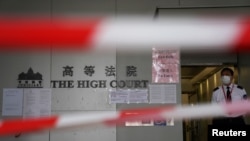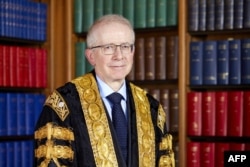Two senior British judges resigned from Hong Kong's highest court on Wednesday as part of a broader British rebuke of the territory's claim that its courts are independent of political interference.
In a prepared statement released by Lord Robert Reed and his colleague Lord Patrick Hodge, the judges cited the territory's Beijing-imposed National Security Law (NSL) as central to their decision, which followed discussions with Dominic Raab, the U.K. lord chancellor and justice secretary.
"I have concluded, in agreement with the government, that the judges of the Supreme Court cannot continue to sit in Hong Kong without appearing to endorse an administration which has departed from values of political freedom, and freedom of expression," said the statement. "Lord Hodge and I have accordingly submitted our resignations as non-permanent judges of the HKCFA with immediate effect."
Britain, which handed Hong Kong back to China in 1997, has said the security law that punishes offenses like subversion with up to life imprisonment has been used to curb dissent and freedoms. London also says the law is a breach of the 1984 Sino-British Joint Declaration that paved the way for the handover.
British officials on Wednesday issued comments explaining their decision to withdraw the judges from Hong Kong's highest court, calling their presence untenable.
"The situation has reached a tipping point, where it is no longer tenable for British judges to sit on Hong Kong's leading court and would risk legitimizing oppression," said British Foreign Secretary Liz Truss in a statement. "I welcome and wholeheartedly support the decision to withdraw British judges from the court."
Raab said, "I thank our judges for being a bastion of international rule of law in Hong Kong over the past 25 years."
Brian Davidson, the British Consul General to Hong Kong and Macao, also echoed the announcement in a video posted on Twitter.
Hong Kong government officials, however, were quick to respond to the resignations, calling the national security law typical for any country seeking to defend itself. In a harshly worded statement, officials called the British decision "appalling."
"We take strong exception to the absurd and misleading accusations against the NSL and our legal system," the statement said. "Every country around the world would take threats to its national security extremely seriously."
Some observers not surprised
Hong Kong legal and political experts have said the action was expected because rule of law in the city has deteriorated in recent years.
Democracy advocate and political scientist Joseph Cheng told VOA in an email that the decision of the two British judges shouldn't come as a surprise.
"This is expected as the international community becomes aware of the deteriorations in the rule of law in Hong Kong," he told VOA. "Western societies know very well that the rule of law can hardly be maintained effectively when freedom of media and civil society are suppressed.
"Within the judiciary, the implementation of the National Security Law has been quite damaging," added Cheng, who was secretary general of the Civic Party, a pro-democracy liberal political party in Hong Kong, and a member of various pro-democracy groups.
"A special group of judges have been chosen to adjudicate national security law cases, no juries are provided for such cases, and those prosecuted normally cannot seek bail. ... The situation is expected to further deteriorate in the near future."
Eric Yan-Ho Lai, a law analyst and fellow at Georgetown University, wrote on Twitter that the judges' decisions were "respectable."
"The resignations of Lord Hodge and Lord Reed from Hong Kong's Court of Final Appeal are respectable moves in light of the ongoing political suppressions in the city," he tweeted. "Yet it's uncertain whether the remaining (Non-Permanent Judges) NPJs, who are retired judges, will follow so."
He added that the U.K. Supreme Court's statement "appears to imply the resignations are votes of no confidence to the city's administration that does not respect political freedom and free speech anymore, and the Court does not want to collaborate with the Hong Kong administration anymore."
The Hong Kong Court of Final Appeal website, which has yet to be updated, lists 12 overseas non-permanent judges including the departing Lord Hodge and Lord Reed. Judges from Britain, Australia and Canada make up the list.
Chan-Chak Ming, president of the Law Society of Hong Kong, issued a statement to regional media outlets calling the criticism of Hong Kong's judiciary system "unfair and unfounded."
Six-month report
Wednesday's announcement is the latest development in an increasingly strained relationship between Britain's legal professionals and officials in Beijing.
In December, Britain released a six-month report about Hong Kong that outlined the eroding freedoms that have taken place since the enactment of the security law. The report included the accusation that Hong Kong's judicial independence was at risk.
But Hong Kong's chief of justice, Andrew Cheung, hit back in January stating that Hong Kong's judiciary independence is a "fact." Hong Kong legal experts disputed that in interviews with VOA.
Former Democratic Party leader Emily Lau hopes the judiciary can remain uncompromised.
"The foreign judges sitting in the Court of Final Appeal as stipulated in the Basic Law has been regarded as a sign of international confidence in the independence of the judiciary and the rule of law in Hong Kong, which is vital to the city as an international financial center," she told VOA.
"I hope the legal profession and the judiciary can remain independent and professional and can resist pressure from the powerful sectors, to ensure the rule of law, due process and to safeguard the Hong Kong people's human rights and personal safety."
Following Hong Kong's 2019 pro-democracy demonstrations, Beijing implemented the national security law, arguing that it was required to bring stability to the city. Critics, however, point out that the law prohibits secession, subversion, and collusion with foreign forces, criminalizes dissent, and makes it easier to punish protesters and reduces the city's autonomy.
Under the new law, authorities have waged a political crackdown on dozens of civil society groups and independent media outlets. At least 150 dissidents have been arrested since the law was implemented, including dozens of democratic lawmakers and political figures.
In landmark cases, some dissidents have faced trial without a jury and with specially enlisted national security judges.
British judges have long served among the foreign jurists appointed to Hong Kong's highest court, an arrangement that London had long described as a way to maintain confidence in the city's legal apparatus amid Beijing's tightening political grip on the territory.
Fourteen non-permanent judges remain at the Hong Kong court, including 10 from other common law jurisdictions such as Australia and Canada.
The Hong Kong Bar Association called Britain's decision "a matter of deep regret" and appealed to the Court of Final Appeal's remaining overseas judges to stay and serve the city and help uphold its judicial independence.
Some information for this report came from from Reuters and The Associated Press.








